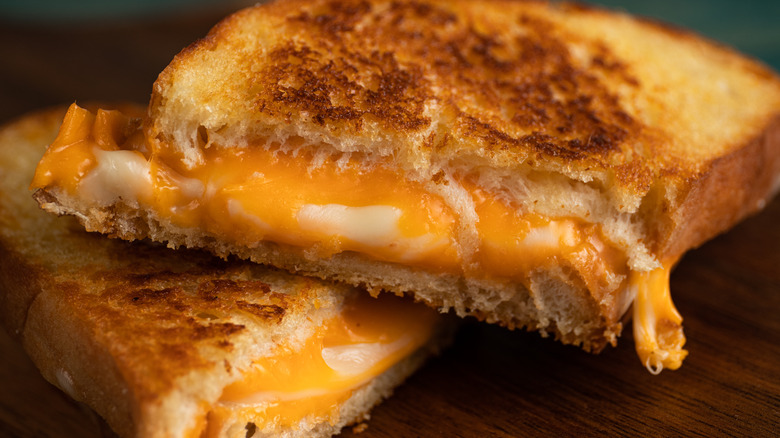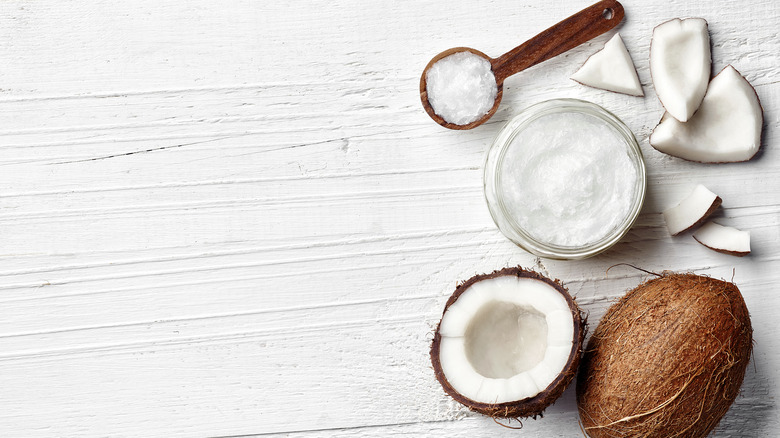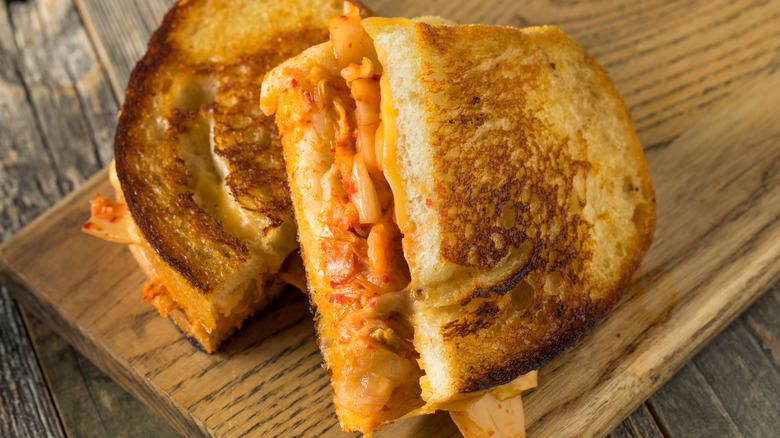The Secret Ingredient For A Crispier Grilled Cheese
Grilled cheese sandwiches are the ultimate easy-to-make comfort food. People may have been enjoying the cozy treat as far back as Ancient Rome — we know they were eating something resembling the melted cheese on bread that we know and love today, according to How Stuff Works. The contemporary grilled cheese sandwich can trace its ancestry to the French croque monsieur and the "toasted cheese" sandwich that began appearing in American cookbooks during the 1920s and '30s.
Though the tasty snack is accessible to chefs of all levels and requires few ingredients — bread, cheese, and butter or oil for grilling — the suggestions and tricks for getting the sandwich's crispy exterior and gooey interior just right are infinite. Most experts and amateurs alike can agree on basics like the age-old rule that grilled cheese requires patience, meaning that you grill it slowly and at a low temperature (via Bon Appétit). Additionally, using a covering for the frying pan to help the cheese melt more expediently as the bread crisps, as suggested by The Washington Post, is relatively universal. However, other discoveries are more unexpected. For example, the best type of fat to get that just-right crispy surface.
Coconut oil for ultra crisp grilled cheese
If you're a big fan of crispy textures, using coconut oil is an excellent cooking choice. The oil can withstand high temperatures, making it ideal for sauteeing, frying, and generally getting a golden crunch on anything you cook in it (via SFGate). Kitchn tested several common types of cooking fats and oils when preparing grilled cheese and found that coconut oil left the sandwich with a desirable crisp, even texture, and picture-perfect color.
It's worth noting that many opt to use coconut oil in the kitchen due to its nutritious reputation. Unfortunately, Healthline explains there's little evidence that, when used in cooking, coconut oil provides those health benefits. So, when deciding to cook with coconut oil, do it for the way the oil elevates fried and grilled foods — like the beloved grilled cheese sandwich — not for its nutritional content.
While coconut oil is the best option for a crispy texture, there is one downside to using the oil, which luckily can be easily avoided with some planning.
Add flavor boosters for the best of both worlds
For those worried about an overpowering flavor in their grilled cheese, Kitchn reports that coconut oil's taste isn't noticeable. In fact, the one big drawback of using coconut oil is the lack of that special flavor that other fats, like butter or olive oil, provide. So for sandwiches that are both punchier and crispier, you may want to add something extra.
One option is to choose your cheese wisely and pick cheeses that not only melt well but also pack in the flavor, like a young cheddar or fontina (via Bon Appétit).
To really take your sandwich to the next level, you can also include ingredients like sweet sliced apples or tangy kimchi. Another option for a flavor boost is to include herbs and spices such as chives and fresh black pepper — as we do in our ultimate grilled cheese recipe — or really think outside the box and slather on some peanut butter (chunky or smooth, we'll leave that up to you).


